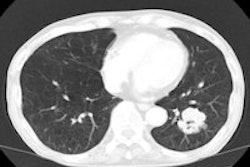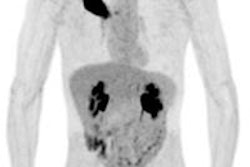
An innovative lung cancer screening pilot project in Northern Ireland designed to target selected patients older than 50 began at the end of November. The scheme is based on sensitive, low-cost chest x-ray, the first port of call to exclude lung cancer, according to consultant radiologist Dr. Stephen Hall from the Southern Health and Social Care Trust.
Patients with a history of smoking, breathlessness, weight loss, voice change, or a two-week cough have been singled out by a regional media campaign that encourages self-referral to one of the scheme's six screening centers with a catchment area of 310,000 people.
"In lung cancer awareness month, physicians from the Southern Trust obtained funding from cancer charities, including Macmillan, for a three-month pilot. Most of this money has been put into the media campaign. In total, 70 patients had been screened by the eighth day of the project and three cases needed further investigation; there was one case of probable disease. We believe this drive will impact a significant number of patients," said Hall, who is also associate medical director of the Trust's Cancer & Clinical Care Division.
The aim of this screening pilot is threefold, he explained. First, to pick up and investigate chest symptoms related to early lung cancer; second, to pick up chronic lung disease that may benefit from treatment; and third, to encourage symptomatic patients to go for a direct-access chest x-ray or to contact their primary care provider for a chest x-ray referral.
"At the moment, the pilot is bypassing primary care. Studies have shown that in 25% of [lung] cancer cases, there had already been three attendances by patients to primary care. If patients have a cough and weight loss, why clog up the GP's waiting room?" Hall told AuntMinnieEurope.com.
He pointed to the benefit of x-ray screening -- x-ray being sensitive enough to detect early lung cancer but obviating the extra cost streams associated with detection of subtle abnormalities by CT necessitating follow-up investigation.
"My feeling is that we will be able to confirm 'no harm' at the end of the pilot, and that the scheme will continue beyond February. There are challenges, however," Hall noted. "The catchment area has a high rate of lung cancer incidence as there is a lot of old industry and many smokers. The majority of the target population is male, but men from this rural and working class area are quite slow to attend screening projects."
On the plus side, he points out that so far the pilot patients have been very compliant, filled out the forms and history correctly, and been in and out within 10 minutes. The voluntary nature of the pilot makes it far more appealing for the individual rather than being "summonsed" for a procedure by letter. Furthermore, they don't have to face the large outpatient waiting times, and with six locations to choose from, geographically, patients will not be far from a convenient walk-in center.



















